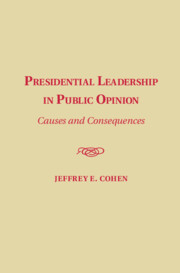Book contents
- Frontmatter
- Contents
- Figures
- Tables
- Acknowledgments
- 1 The Many Meanings of Presidential Leadership
- 2 Evidence of the Public Demand for Presidential Leadership
- 3 Congressional Sources of the President's Leadership Image
- 4 Success in Congress and Perceptions of Presidential Strength
- 5 Presidential Representation and Public Opinion
- 6 Presidential Leadership and Presidential Elections
- 7 Perceptions of Presidential Leadership, Trust in Government, and Attitudes toward Congress
- 8 Presidential Leadership, Public Opinion, and American Democracy
- Sources
- Index
6 - Presidential Leadership and Presidential Elections
Published online by Cambridge University Press: 05 May 2015
- Frontmatter
- Contents
- Figures
- Tables
- Acknowledgments
- 1 The Many Meanings of Presidential Leadership
- 2 Evidence of the Public Demand for Presidential Leadership
- 3 Congressional Sources of the President's Leadership Image
- 4 Success in Congress and Perceptions of Presidential Strength
- 5 Presidential Representation and Public Opinion
- 6 Presidential Leadership and Presidential Elections
- 7 Perceptions of Presidential Leadership, Trust in Government, and Attitudes toward Congress
- 8 Presidential Leadership, Public Opinion, and American Democracy
- Sources
- Index
Summary
This chapter turns to the third question raised by the theory of public perceptions of presidential leadership: the implications of those perceptions for the presidency and the political system. The previous chapter touched on the question of implications for the presidency, showing that presidential strength and representation influence job approval ratings. This chapter turns to the implications of presidential leadership for elections.
Because those leadership perceptions affect job approval ratings, it is not much of a stretch to also suggest that they will affect elections when a president is running for reelection. But do those perceptions toward an outgoing president affect the electoral results for his successor? The theory of public perceptions of presidential leadership predicts that those perceptions will affect nonincumbent presidential elections because attitudes toward the president are important to many voters and voters generalize their attitudes from the sitting president to other elements of the political system.
DETERMINANTS OF PRESIDENTIAL ELECTIONS
The vast literature on presidential elections has looked at several sets of factors to explain who wins such contests. These factors include partisanship, candidate traits, the issue positions of candidates, and campaign events and processes (Lewis-Beck et al. 2009). For current purposes, there are several relevant subtopics: approval effects, succession effects, and party reputations. These literatures present varying expectations about the conditions under which presidential leadership may affect voting in presidential elections.
Since Sigelman's (1979) seminal article, presidential approval has been a mainstay in studies of presidential elections. Sigelman's paper spawned two types of studies: aggregate-forecasting and individual-level vote analyses. For both sets of studies, presidential approval is now an obligatory variable. The effects of approval on presidential elections have been documented in study upon study, the only debate being that over the degree and conditionality of impact.
Although vaguely worded, the approval question conveys a sense of how voters rate the performance of the president in office and is generally thought of as a type of retrospective evaluation that voters use in deciding who to vote for (Campbell, Dettrey, and Hongxing 2010).
- Type
- Chapter
- Information
- Presidential Leadership in Public OpinionCauses and Consequences, pp. 139 - 155Publisher: Cambridge University PressPrint publication year: 2015



